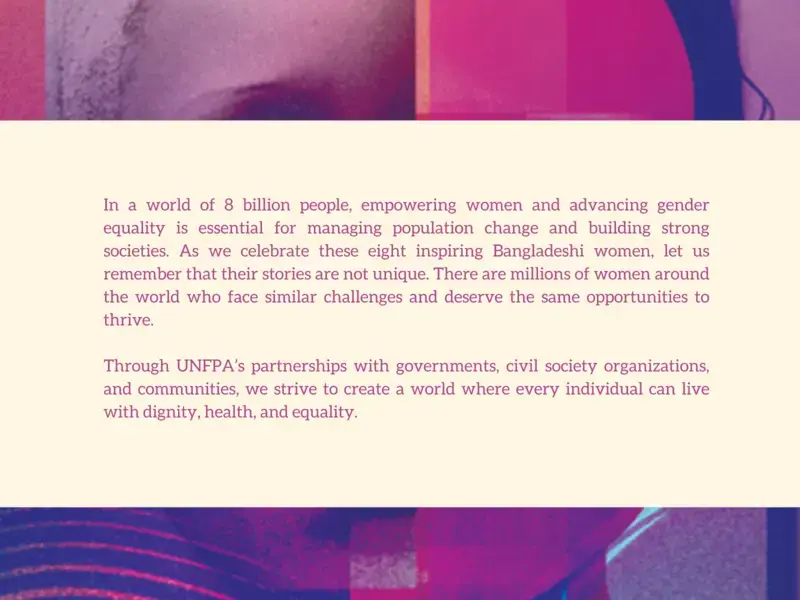Photos
The Power of Rights & Choices: Stories of 8 Bangladeshi Women in a Changing World of 8 Billion
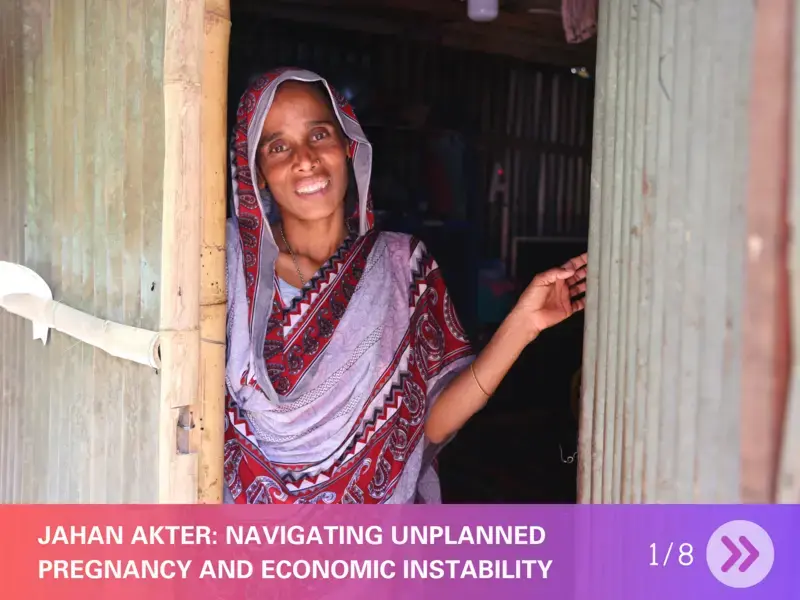
Jahan's story started 18 years ago when she got pregnant at the age of 16.
Due to the lack of access to reproductive healthcare services, Jahan didn't know about her pregnancy until much later. She was not ready for this - Jahan's husband and she were already struggling to make ends meet, and adding a baby to the family would only add to their financial woes. Even though Jahan
was not willing to have the child, her family members insisted on it. A month after her son was born, Jahan’s husband passed away, leaving Jahan and her newborn alone to navigate the challenges of unplanned pregnancy.
Jahan Akter's story is the story of millions of women living in poverty in Bangladesh who have limited access to contraception and reproductive health services. Today, Jahan is a 35-year-old widow living in Dhaka's Daripara slum. Her struggles during her pregnancy have made her an advocate for young women's reproductive rights.
their economic stability."
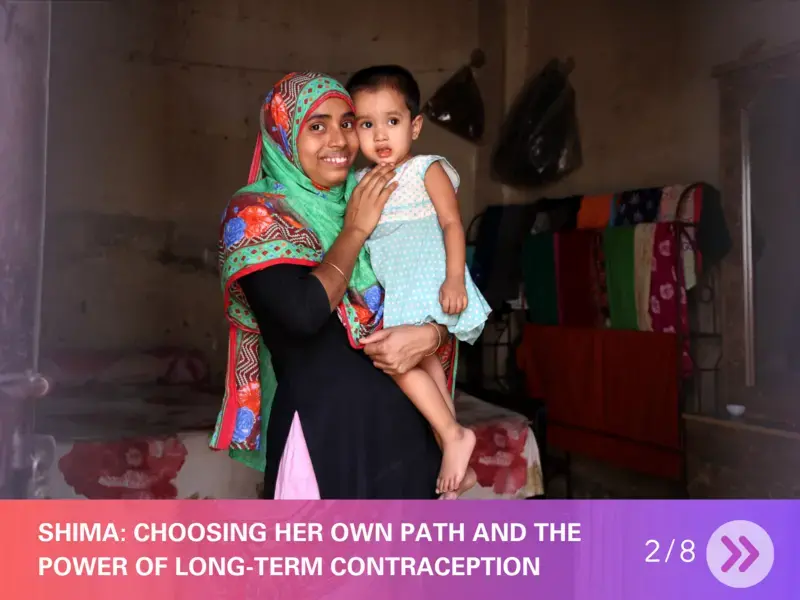
Shima Akter, a 19-year-old mother and housewife - is an inspiration to thousands of young women in Bangladesh. Her journey reflects the power of making choices and the importance of using contraception to plan one's life.
Shima Akter's decision to get married at a young age wasn't approved by her parents, but it was the right choice for her. She fell in love with a boy when she was fifteen and decided to marry him. Shima's pregnancy was unexpected, but she happily welcomed the news with open arms. However, Shima realized that getting married at a young age was not the right decision.
Her decision to use long-term contraception reflects her understanding of the importance of family planning. Young women like Shima inspire us to take charge of our lives and make informed decisions. Access to long-term contraception methods can help young women plan their families and achieve their goals. We must encourage more women to choose their own paths and make informed choices.
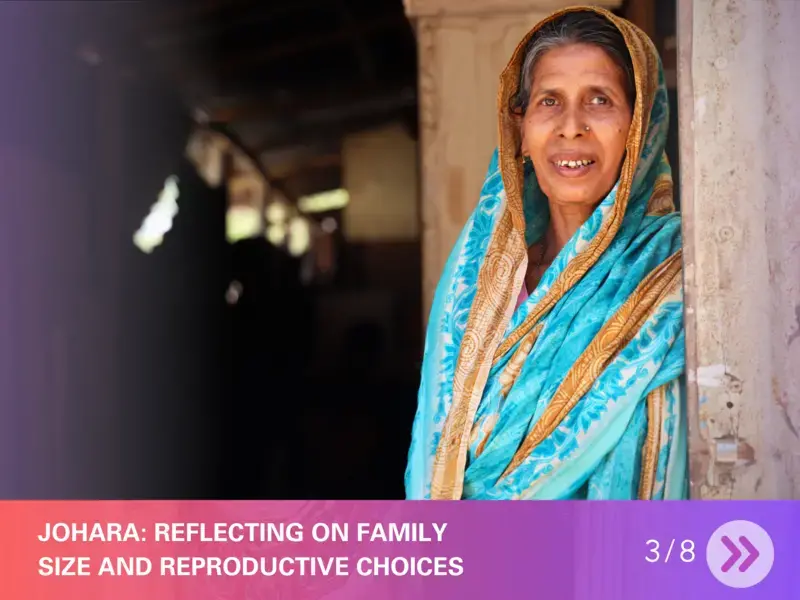
Johara's story is not uncommon, especially for women of her generation. However, her experience sheds light on a topic that remains relevant today- family planning.
my daughters in using the contraceptive pill."
Johara's story highlights the importance of reproductive choices, especially for women. Family planning allows individuals to make informed decisions about their families' size and timing, leading to better health outcomes for women and their children. In communities like Johara's, where large families were once the norm, family planning education can change the narrative and lead to healthier families.
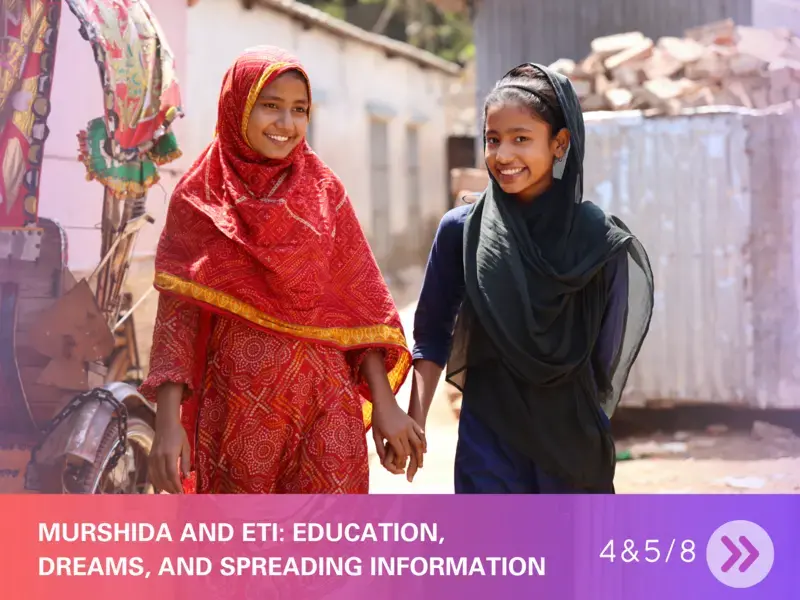
Education is the key to unlocking one's potential and realizing dreams. Unfortunately, not every child has access to it.
Murshida and Eti, two sisters from different backgrounds, share a passion for education and a desire to spread information to their communities. Murshida, a 12-year-old girl living in the countryside with her father, dreams of becoming a teacher. While her older sister, Eti, who lives in Dhaka with their mother, has a similar passion for education, but unfortunately, her family cannot afford it. Instead, Eti takes advantage of the Kishore Resource Centre sessions (Adolescent Resource Centre) and uses the information to educate others on - child marriage, menstrual health management, rights and choices and life skills information.
Murshida and Eti's stories are a reminder that education and information are powerful tools for positive change. Young girls have the potential to shape a better future for themselves and their communities.
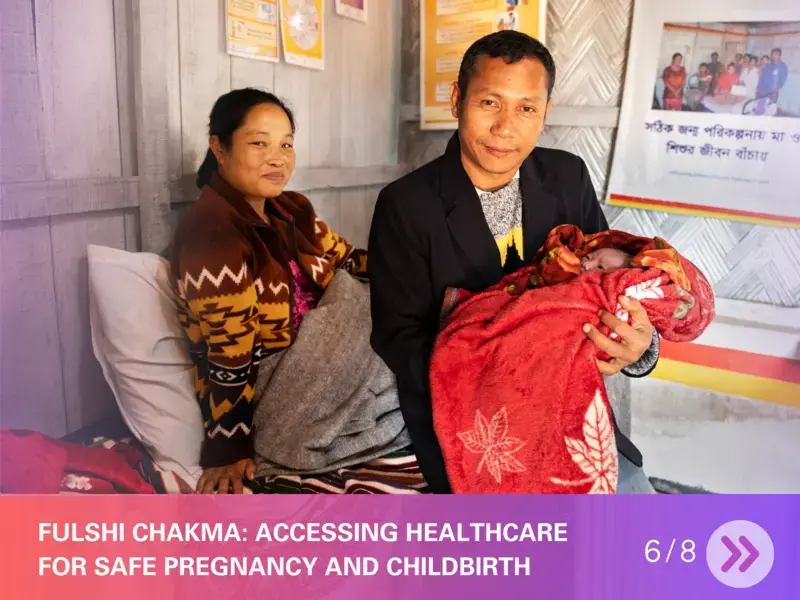
Fulshi’s story is an inspiring tale - emphasizing the need for comprehensive maternal healthcare services for all women.
After experiencing an unsafe home birth with her first child, Fulshi, a resident of a hard-to-reach area in Khagrachori, Bangladesh, sought out counselling from midwives and decided to give birth in a hospital for the safety of herself and her second child. Her first child, a nine-year-old boy, was born at home due to the lack of proper facilities at the time.
Despite the challenges of living in a remote area, Fulshi was determined to give birth in a safe and supportive environment. She would go to the facility to do regular Antenatal check up and soon, Fulshi gave birth to a beautiful baby girl at a UNFPA and FCDO-supported health facility.
Her husband, a farmer, stood by her side throughout the entire process, providing love and support.
Access to quality healthcare services during pregnancy and childbirth is a basic human right. Unfortunately, many women around the world are still facing significant barriers to accessing them. Fulshi's story is a powerful reminder that every mother deserves access to quality healthcare services
during pregnancy and childbirth, regardless of their circumstances.
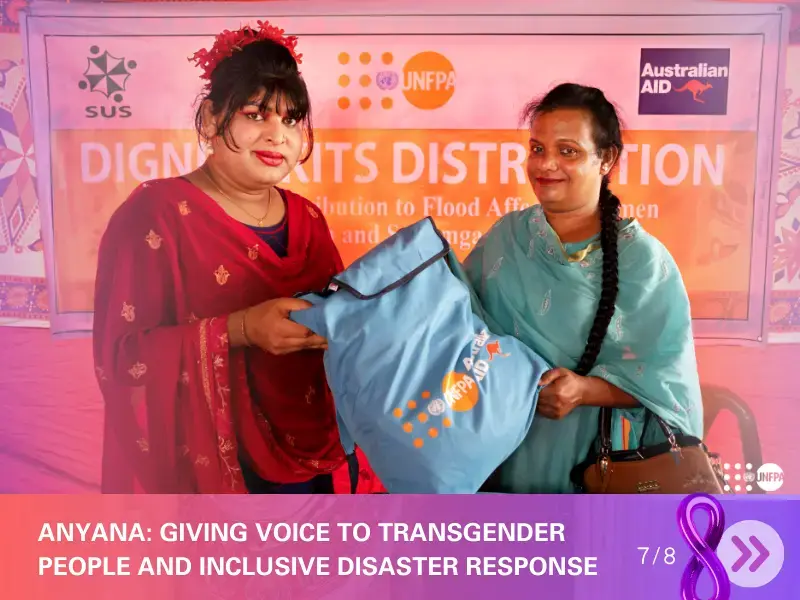
Anyana, a transgender activist from Bangladesh, is making waves in the fight for transgender rights and inclusive disaster response.
Born and raised in Bangladesh, Anyana experienced discrimination and stigma because of her gender identity. Determined to make a difference, She founded Shopner Chowa Shomajkollan Sangstha, an organization dedicated to improving transgender individuals' lives through training
and employment opportunities.
In the words of Anyana - "For us transgender people, life gets even more difficult during a crisis." She goes on to recount her experience during a recent flood, saying, "Last year, during the flood, everyone in my village ran around to seek shelter in the facilities, but we were not allowed to stay at the same shelter. Are we, not human beings, and are we not affected by disasters? If so, then why are we excluded?"
Anyana believes that inclusive disaster response plans can help alleviate some of these issues and ensure that every individual is treated with dignity and respect. Anyana's story highlights the importance of inclusive approaches in social, economic, and political spheres.
By advocating for the rights of transgender individuals in all aspects of life, she is paving the way for a more equitable and just society.
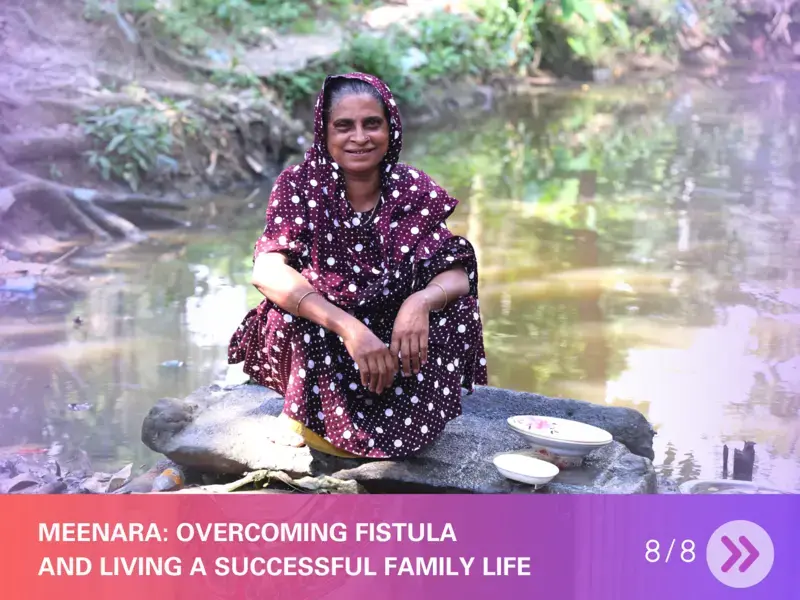
Meenara's inspiring story sheds light on the urgent need to address fistula as a public health and human rights issue.
Meenara, a 52-year-old woman who suffered from constant urination leakage for 20 years, reflects on the emotional toll of living with fistula - a debilitating and stigmatizing ailment that affects millions of women worldwide, especially those living in developing countries.
Meenara developed this condition during prolonged and obstructed childbirth. Since then she was ashamed to go out and meet people or attend social gatherings due to constant urination leakage.
Despite the physical, emotional, and social challenges, Meenara did not lose hope or her will to live a meaningful life. Instead, she sought medical help and underwent a successful surgery, which freed her from the fistula and allowed her to recover her sense of dignity, confidence, and happiness.
Fistula is a devastating condition that can have life-altering effects on a woman's physical and emotional well-being. However, Fistula is not only preventable but also curable. By educating the causes, consequences, and treatments of fistula, more women can seek medical help and reduce the
stigma and discrimination.
